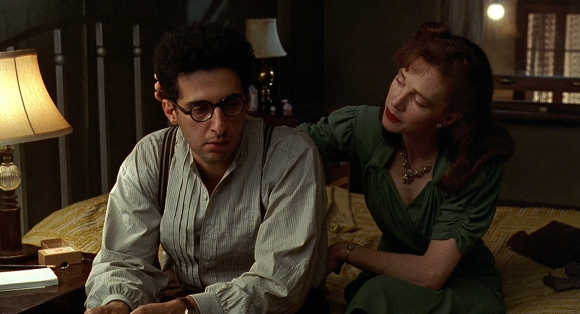
Barton Fink is packed full of symbolism, allegory, and open-ended questions. About one man’s struggles as a screenwriter in Hollywood, the film is at once realism and surrealism; comedy and tragedy. Willing you to discern meaning behind images and lines, Joel and Ethan Coen tease the viewer with a multitude of possible interpretations of their story and its characters. Littered with references to other films, novels, and poems, the viewing experience is overwhelming but rewarding.
With exhilarating performances from John Turturro, John Goodman, Michael Lerner, and Judy Davis, this is very much a character driven piece. Exploring the “life of the mind” from different angles, we are introduced to a variety of characters, each with their own issues and secrets. Barton Fink (Turturro) is a successful Broadway playwright who is asked by Capitol Pictures to write movie scripts for them in Hollywood. He agrees, albeit reluctantly, and checks himself into the Hotel Earle (where he meets bellhop Chet, played by Steve Buscemi). Wanting to avoid the flamboyant world of Hollywood money, Fink hides himself away in this obscure and dilapidated place, where the wallpaper peels off the walls and the bed’s springs creak.
Soon he becomes acquainted with his neighbor in residence, Charlie Meadows (Goodman), a travelling salesman with stories to tell. Having been commissioned to write a wrestling picture, Fink finds himself struggling for inspiration, and Charlie becomes a source of comfort for him during his long nights sat at his typewriter. Through forced socialising, Fink also encounters a writer named W.P. Mayhew (John Mahoney), and his secretary Audrey Taylor (Judy Davis). Immediately attracted to Audrey, it is Fink’s relationship with her that becomes the catalyst not only for his writing, but also for the action of the second half of the film.
Poking fun at the hypocrisies of Hollywood as well as the self-obsession of intellectuals, what the eventual absurdity of Barton Fink proves is that the life of the mind is truly chaotic. Fink desires an objective understanding of the “average working stiff, the common man”, but this is nothing more than a selfish ideal. What he finds instead is that such simplicity does not exist. Even the fishmongers are complicated, and everything is subjective. Our writer finds this out the hard way because of his stubborn refusal to listen to anyone but himself. Fink’s distinction between high art and low art is also his downfall, as he finds himself absorbed by a touristy picture on his wall whilst trying to write a masterpiece. He wants his work to be “the stuff of life” and yet he lives in a fantasy, ignoring those around him and creating drama that may be good, but is as fabricated as the Hollywood pictures he despises.
Charlie and the Hotel Earle have been seen as metaphors for many things, but the beauty of the film is that you can take everything at face value as well as trying to pick it apart for analysis. The sets and costumes are designed with a sharp-eyed attention to detail, lending the film a distinctive and memorable style. The rusty colours of the hotel match the browns of suits and shoes; and as Fink’s creative process goes on, his appearance becomes more and more disheveled. Capital Pictures boss Jack Lipnick (Michael Lerner) is brilliantly smarmy in his cream-coloured robes and jackets, and Audrey’s red lips and hair are set strikingly against her white and blue dresses. A captivating watch, the film’s score by Carter Burwell, beautiful and odd at the same time, is a perfect match for a bizarre subject matter.
I knew nothing about this film going in to it, and I am glad that I didn’t. After the first half I thought I had this down as a quirky expose of screenwriting in Hollywood. Just like Fink, I was fooled into thinking that Charlie was your average Joe: round, friendly and funny. Unfortunately (or perhaps fortunately), life isn’t so simple, and isn’t so truthful either. A celebration of madness, and proof that “truth” is sometimes stranger than fiction, Barton Fink blurs meaning until you’re not quite sure where you are or what you’re watching. But goddamn is it good, whatever it is.
FINAL VERDICT: ★★★★★
